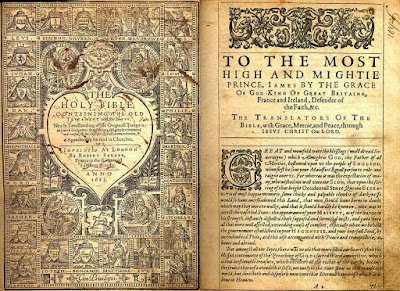In the 2nd Article of the
Statement of Principles we find the following: “The King James
Version is the preferred English Translation.” Just because it is
the “preferred” translation doesn't mean it is the only
translation. We are not of those who loudly proclaim themselves to
be “King James Only,” We certainly are not of those who claim
that any English translation of the Bible is inspired.
For many years it has baffled me why
Baptists, in particular, want to venerate the Authorized Version of
1611. It was translated by the authority of the King of England,
and, if you want to say it was inspired, then you must say the rules
given by said king to the translators was inspired as well. Its
translators were men who would have imprisoned our forefathers in the
faith and sent them to the stake. Yet for some reason those who
perverted the ordinances of God are venerated as inspired by the God
whose word they contradict.
Remember, our forefathers in the faith
who were contemporary with the translation did not use it. Why would
any independent (non-Anglican) use a Bible authorized by the Anglican
Church? Indeed, Edward Barber in his Small Treatise on Baptism near
the end says he hopes to have have enough money to publish a couple
of other works including a work on the errors of the new authorized
version of the Bible. So we see that far from embracing the King's
Bible, the early particular Baptists read it critically and called it
for its errors.
However, we also can readily admit, by
the predestinating providence of God, that for almost 200 years it
was the only English language Bible readily available. Even with all
its faults, it held up over time. It was my 1st Bible and
the translation from which the Lord showed me the doctrine which to
this day I love. On my desk right now are 3 editions of the King
James Version (Nave's Study Bible, a reprint of the Aitkin Bible
1782, a reprint of the 1611 edition with Apocrypha,) an American
Standard 1901, a Geneva New Testament of 1557, a Matthew's Bible
1537, a New English Bible (with Apocrypha,) a New King James, a
Charles Thomason translation of the Septuagint, and a New Revised
Standard (with Apocrypha.) Many times I look at all of them when
studying a passage; sometimes I only look at one. I don't believe I
am tied to any, though I have my preferences.
I close with this: read your Bible! It
matters not the translation; read it. Study it. Meditate on it.
There's enough in the poorest translation of the sacred text for the
man of God to be instructed in righteousness. Amen.


Greetings Bro. Lackey, I believe it does matter which translation of the Bible that one reads on a regular basis. I would not recommend many of the recent "translations". For what its worth, I like and trust the Geneva Bible(1599).
ReplyDeleteRalph Dale
Greetings to you, Brother Dale. I, too, like the Geneva Bible, although I use the 1560 more than the 1599. I also like the NKJV because in the footnotes, not in the text, it gives the differences between the Greek texts used in the more modern versions and the traditional text used by KJV translators. I don't like a lot of the modern translations either, but it's because I don't like the Greek text they translate from. Perhaps the KJV should have been continued to be revised after 1792.
DeleteThe Geneva can't even get the account of who slew Goliath correct
ReplyDelete2Sam 21:19: "And there was yet another battle in Gob with the Philistines, where Elhanan the son of Jaare-Oregim, a Bethlehemite slew Goliath the Gittite: the staff of whose spear was like a weaver’s beam." Geneva.
The AKJV which is the infallible inspired word of God in English does however
2Sam 21:19: "And there was again a battle in Gob with the Philistines, where Elhanan the son of Jaare-oregim, a Bethlehemite, slew the brother of Goliath the Gittite, the staff of whose spear was like a weaver's beam."AKJV